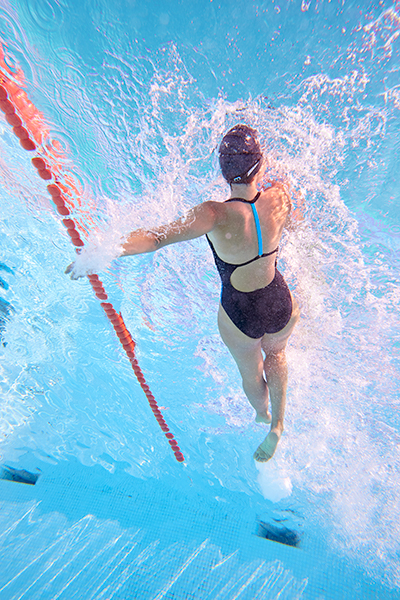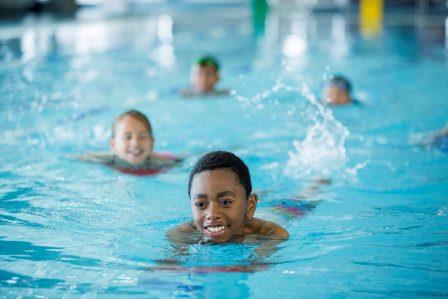Swim Myths
Have you been misinformed all these years?
Swimming is a fantastic activity but for some reason it holds a whole host of myths. Well, we’re going to debunk them and filter out the FAKE NEWS. Here are 5 common statements about swimming – which do you think are true and which do you think are false? Complete our "True or false" quiz and keep reading to find out! You never know, it may even improve your technique and keep you safe in the water!

“Swimming after eating is dangerous”
Have you ever been told that you have to wait two or more hours to swim after you’ve eaten? Well, the concern was genuine! Because digestion diverts some of your blood flow from your muscles to your stomach, it was feared that your limbs won’t get enough blood flow to swim. However, this is not true, your body is smart enough to save digestion until later and in fact, eating a couple of hours before a swim will energise you! Good pre-swim foods that give you a consistent supply of energy include porridge oats, wholegrain breads and pasta, sweet potatoes, peas, beans and unsalted nuts.
Want to learn more about what the best foods are to eat before and after a swim? Check out what Zoggs recommend!
“You won’t get a good workout in the pool”
Swimming is a low impact exercise which means it’s easier on your body if you’re nursing an injury or want to avoid joint or knee pain. But that’s all you will get in terms of “easy”! Swimming is one of the best full body workouts out there as it uses most of the muscles in your arms, legs, hips, glutes, abs and back. Using training aids can also help vary your workout by isolating certain areas of the body (eg. Kickboard to strengthen thighs and glutes or Pull Buoy to focus on the upper body helping build strength and arm movement).
“If you work hard, you will swim faster”
An insult to the Olympic sport of swimming! Not anyone can become a fast swimmer by simply being strong and hard working. Although these are great attributes for any sport, Swimming is technique-based with many different strokes to learn and master – even the smallest of tweaks in technique can improve performance greatly! It is important not to push yourself too hard and stick to your own speed and ability to improve.
If you enjoyed this blog, you may enjoy our "Everyone should learn to swim!" blog too!
“You should hold your breath underwater”
Although a natural instinct when underwater, this isn’t an efficient way of swimming, casually or competitively. You’ll be gasping for air between strokes or needing longer recovery breaks after every length. Instead, breathe out steadily while underwater, like you’re blowing up a balloon. This will maximise your oxygen intake and balance your body position more evenly to improve your streamlining.
“You don’t need to hydrate while swimming”
Somehow, whoever started this myth must be able to absorb water as they swim because otherwise it’s actually pretty dangerous! When you are completing a pool workout, as anywhere, you’re raising your body temperature and your body responds by sweating. You are less likely to notice it in the pool as the sweat is immediately washed away, but this makes it even more important to hydrate, to avoid over heating in a warm pool. To rehydrate properly you should drink about 8 ounces every 20 minutes unless you're in the pool for less than half an hour.

References
www.aquagear.com/blog/common-swimming-myths
www.dignityhealth.org/articles/is-swimming-after-eating-really-dangerous
www.wgaquatics.com/2018/10/30/the-ten-myths-of-swimming
www.swimmo.com/blog/tips-tricks/5-more-myths-about-swimming
www.yourswimlog.com/common-myths-about-swimming
www.blog.fitbit.com/swimming-myths-debunked